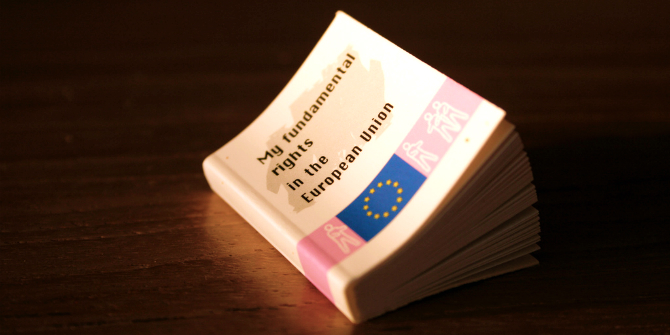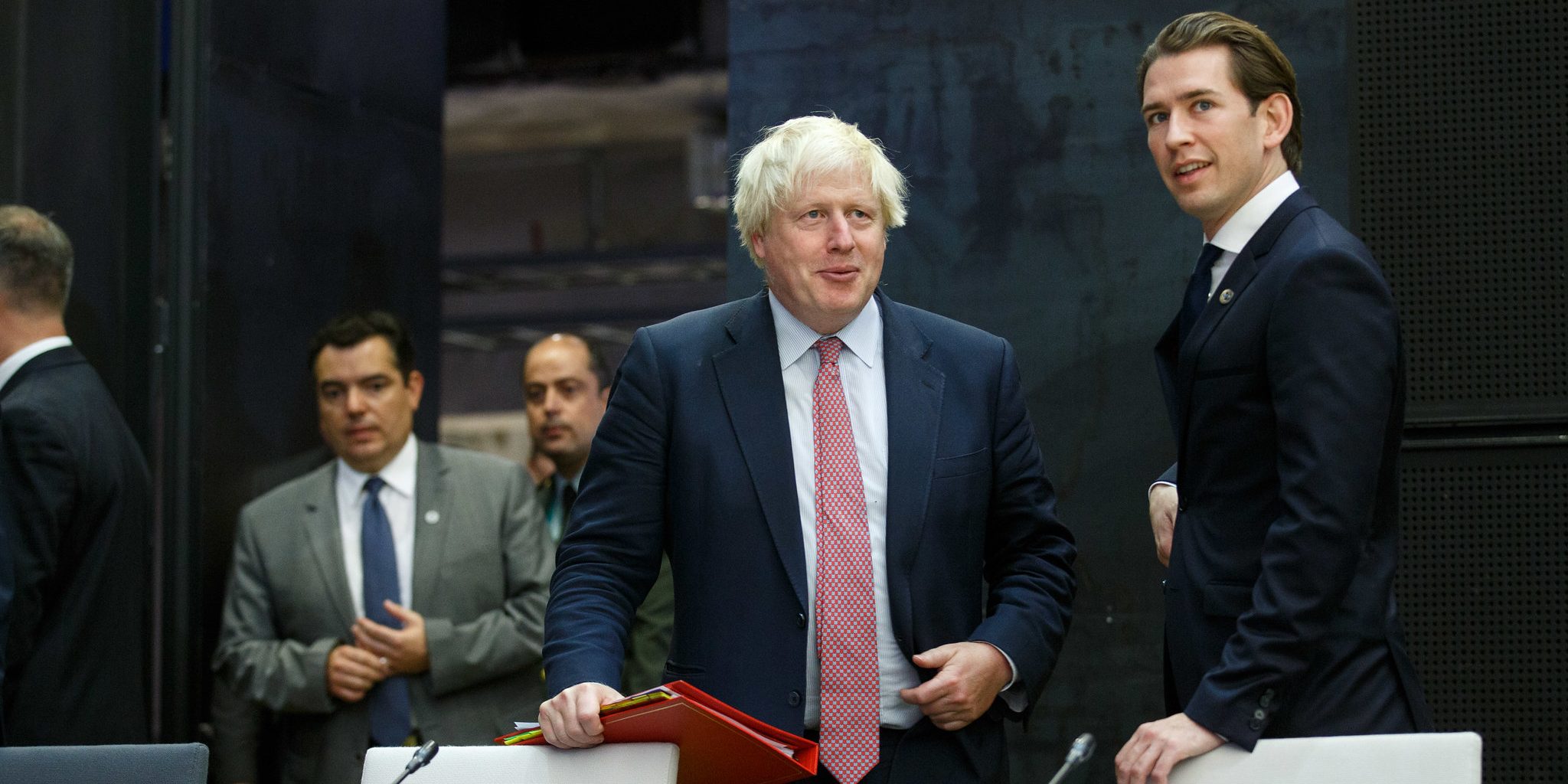
 What would Brexit mean for the protection of fundamental rights in the UK? This was the subject of the sixth hearing of the LSE Commission on the Future of Britain in Europe, which took place on 25 February, convened by Dr Jo Murkens and dedicated to the memory of the late Maurice Fraser. The main narrative which emerged from the very rich discussion of this hearing – a discussion involving politicians, academics, practitioners, and activists – was one of caution: that there needs to be careful thinking (and rethinking) on both sides of the debate because of what is at stake: fundamental rights. Jo Murkens and Sarah Trotter report on the discussion.
What would Brexit mean for the protection of fundamental rights in the UK? This was the subject of the sixth hearing of the LSE Commission on the Future of Britain in Europe, which took place on 25 February, convened by Dr Jo Murkens and dedicated to the memory of the late Maurice Fraser. The main narrative which emerged from the very rich discussion of this hearing – a discussion involving politicians, academics, practitioners, and activists – was one of caution: that there needs to be careful thinking (and rethinking) on both sides of the debate because of what is at stake: fundamental rights. Jo Murkens and Sarah Trotter report on the discussion.
The EU Charter of Fundamental Rights
What would Brexit mean for the protection of fundamental rights in the UK? This was the question which occupied a recent hearing of the LSE Commission on the Future of Britain in Europe, during the course of which a number of fears about the state and fate of fundamental rights protection in the UK emerged. Human rights in the UK are currently protected by three regimes that are interlinked: EU law and the EU Charter of Fundamental Rights; the European Convention on Human Rights, whose effectiveness is enhanced by the Human Rights Act 1998; and domestic rights protection.
The impact of Brexit was first discussed in relation to the EU Charter of Fundamental Rights, which was incorporated into EU law by the Lisbon Treaty, and applies when implementing, derogating from, or acting in the scope of EU law. Although there is certainly scope to question the true extent of the effect of the Charter in practice, some of the more notable cases such as Digital Rights Ireland have contributed to its taking on a life of its own in popular and political imagination. It is widely perceived to have had a significant impact, and it is against that backdrop that its necessity, democratic legitimacy, and coherence were debated during the course of the hearing. What would Brexit mean for the Charter? The view that Brexit would entail the end of the Charter entirely was not sustainable, the panel heard; for EU fundamental rights, as constituted by general principles of EU law and the Charter, would, inevitably, have something of a legacy effect, not least because of their role in guiding the interpretation of domestic statutory instruments already implementing EU law.
The European Convention on Human Rights
So what, then, of the European Convention on Human Rights (ECHR)? This arises because the question of the future of fundamental rights in the UK does not only emerge in relation to the question of Brexit. There is a parallel and ongoing debate over the Conservative government’s commitment to the so-called ‘British Bill of Rights’, which, it was conceded, would probably constitute an “ECHR-minus”. For some participants, both the Brexit and the ECHR/British Bill of Rights debates are rooted in the same attitude: an inward-looking turn towards the repatriation of laws and rights, the concerning and negative signalling of which threatens the UK’s very reputation. Others argued that both the Brexit and ECHR/British Bill of Rights debates raise similar issues, principally those of accountability, democratic legitimacy, and cost, and that they are therefore combined in public debate.
Within that public debate, the issue that has been most exercising is undoubtedly that of prisoner voting and the UK’s failure to comply effectively with the judgment of the European Court of Human Rights on the matter. Although the UK has, in general, a strong record in complying with ECHR judgments, it is such cases as the prisoner voting issue that acquire political salience and command media attention, obscuring and problematising what is, in statistical fact, what one participant described as “a healthy and functional relationship”. Nevertheless, the ECHR and Brexit debate has, to a degree, been combined in public and media perception, such that – as was flagged up by some participants –, the Council of Europe and European Union are often conflated in public imagination, coming together to form “Europe as a source of rights”.

A British Bill of Rights
It was suggested that part of the problem stems from a perceived lack of ‘British’ ownership, history, and pride regarding fundamental rights. Other countries have their own Bills of Rights as well as European-level protections, it was argued by some, so why not Britain too? If the proposed situation was to entail a British Bill of Rights and an international longstop, or a degree of minimum international agreement and then a local colouring of rights at national level, then that would be one thing. But a British Bill of Rights would, of course, not be about this accommodation of a minimum international standard. The more likely scenario would be one of a politically-charged “ECHR-minus”, with fewer rights for fewer people, and an overall undermining of rights protection. The message was: we need to be alert to this new type of British Bill of Rights. The significance of a British Bill of Rights would range from the symbolic to the strategic. On the one hand, the Bill would contribute to public education and culture, and contain rhetorically crafted statements regarding parliamentary sovereignty or the domestic superiority of the UK Supreme Court. On the other hand, the Bill would speak to politicians and lawyers, and could present rights as disposable, dispensable, and diminished. And that is before we even come to the question of what would actually be put in a British Bill of Rights – a challenging question given the different justice systems, public attitudes, and traditions within Britain today.
Leaning in or leaning out? Caution all round
That latter issue, it was pointed out, applies more generally; Brexit is perceived differently in each of the devolved regions. But the broader question pertains to the type of debate that we want to be having. Is it one of leaning in, turning away, asserting ownership, and – as one participant put it – “putting law and rights back in the national box”? Or is it one of leaning out and realising transnational notions of citizenship, identity, and rights? Or can we have it all? Concern was expressed on both sides of the debate, and the main narrative that came across all round was one of an urgent need to reclaim caution from the wind – to think and rethink very carefully the positions that are being advocated. Those arguing in favour of Brexit and the repatriation of laws and rights were urged to be aware of the damaging message that this could send out with respect to Britain’s commitment to international cooperation and international standards of rights protection. Those advocating that Britain remain within the EU were urged to think of the bureaucratic credentials of the EU and the purportedly questionable necessity of the Charter. Those harbouring the view that Brexit would entail liberation from the Charter were urged to be mindful of its likely legacy effect in domestic law. And, finally, those arguing in favour of a British Bill of Rights were advised to consider the implications of its amounting to an “ECHR-minus”.
Ultimately, the panel effectively concluded, the question as to the implications of Brexit for the protection of fundamental rights in the UK depends on what we are trying to achieve: internal or external reference points. And that, in turn, is not a question limited to that of the future of fundamental rights. It is a question of the collective vision of national and European society on which the debate over fundamental rights merely casts light.
This post represents the views of the author and not those of the BrexitVote blog, nor the LSE. Image by Jean-Etienne Minh-Duy Poirrier.
Dr Jo Eric Khushal Murkens is Associate Professor in Law at the London School of Economics and Political Science.
Sarah Trotter is a PhD researcher at the LSE Law Department. Her research is in EU law and European human rights law and looks at how being is ordered in Europe






